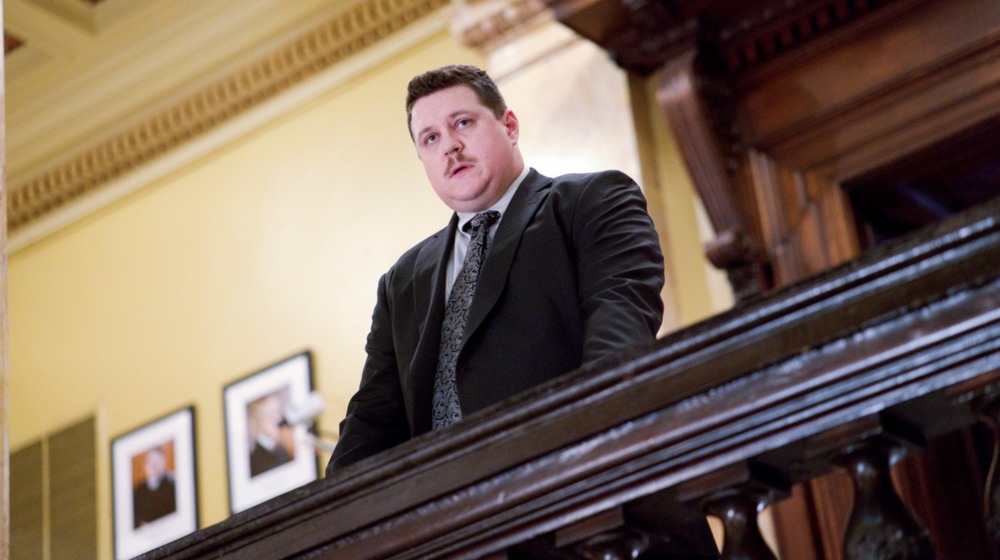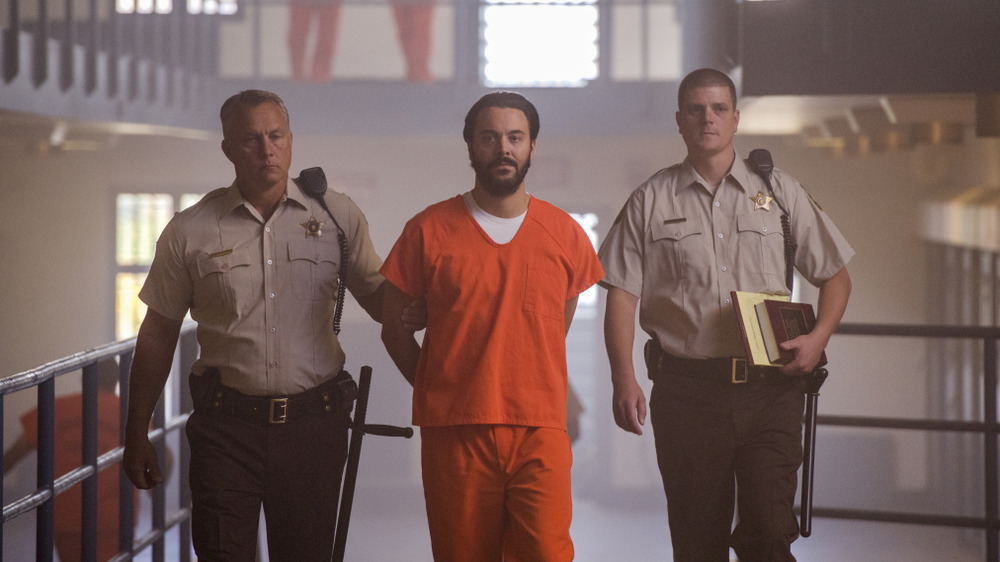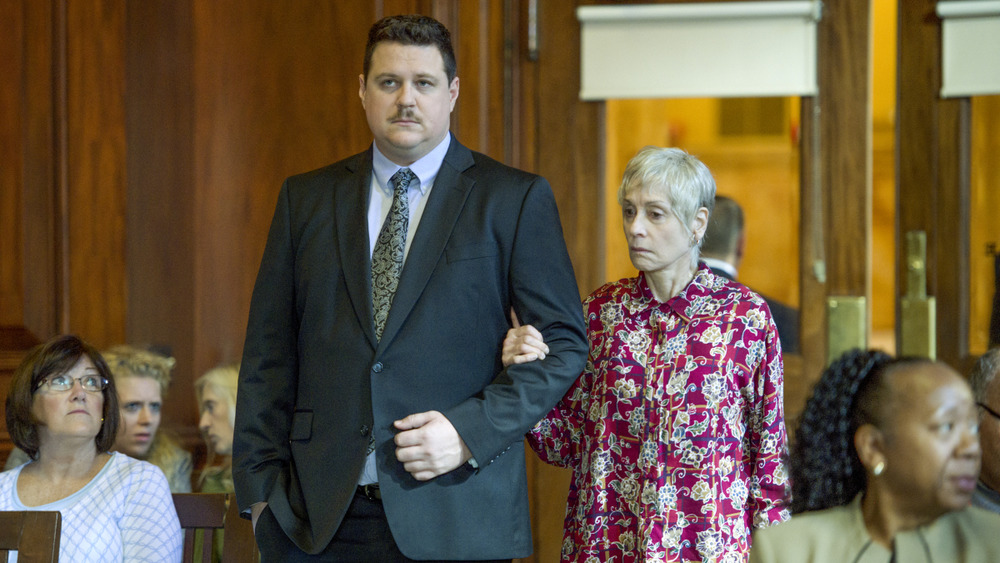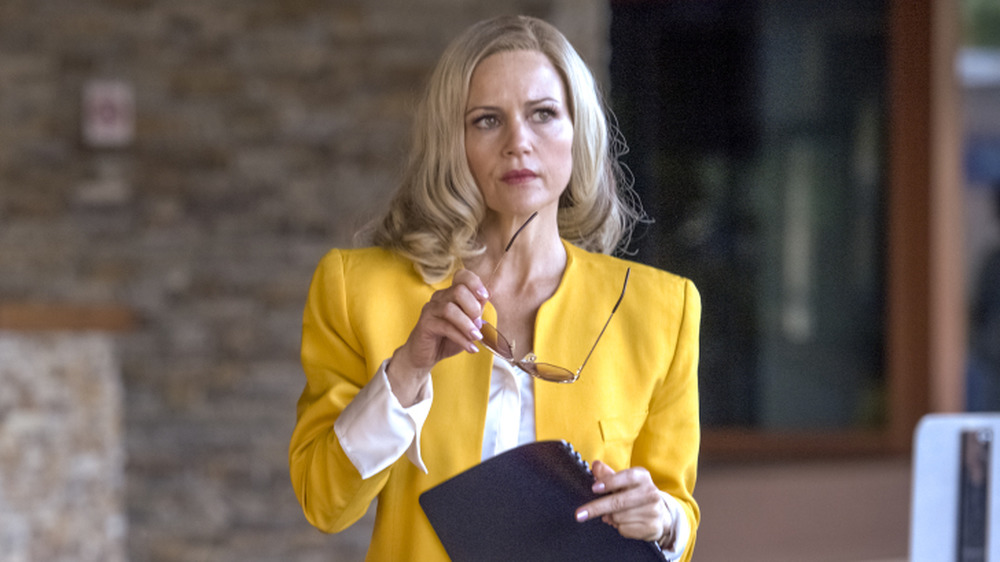The Ending Of Manhunt: Deadly Games Explained
Contains spoilers for Manhunt: Deadly Games
Manhunt: Deadly Games, the true crime anthology series that's currently the number two title on Netflix, mostly ends the way the real story ended, with right-wing domestic terrorist Eric Rudolph (Jack Huston) pleading guilty to the fatal bombings he perpetrated. Meanwhile, well-meaning security guard (later police officer) Richard Jewell (Cameron Britton) tries his best to live a normal life after having his world turned upside down by the media circus surrounding his wrongfully suspected role in the Centennial Olympic Park bombing that Rudolph actually perpetrated. In broad strokes, the ending of the TV series closely parallels the real-life story, though the show does take a few liberties.
Some details, most notably the way reporter Kathy Scruggs' (Carla Gugino) death was portrayed, were fudged for dramatic purposes. Others were truly spot on. Here's what happened on the final episode of Manhunt, and where some of the major players ended up in real life.
The ending for Eric Rudolph
Eric Rudolph, the anti-abortion bomber, is currently serving four consecutive life sentences without the possibility of parole, two related to the 1998 bombing of a Birmingham, Alabama abortion clinic that killed police officer Robert Sanderson, and two for the four bombings he committed in Atlanta in 1996 and 1997, according to CNN. He is currently incarcerated in ADX Florence, the highest security federal prison in America, where he spends 22.5 hours a day in solitary confinement in a seven-by-12 concrete cell. He is housed in a cell block informally known as "Bomber's Row," as it also houses terrorists Terry Nichols, Ted Kaczynski, and Ramzi Yousef, and previously housed Oklahoma City bomber Timothy McVeigh before his execution.
Rudolph's fate on the show is pretty on the nose. As the show's final title card readily admits, Rudolph did eventually publish his manifesto, in which he claims a kind of pyrrhic victory because he "deprived the government of its goal in sentencing [him] to death."
The ending for Richard Jewell
Sadly, Richard Jewell died just two years after Eric Rudolph was sentenced in 2005 (via the New York Times). He died on August 29, 2007 from heart disease and diabetes. He was only 44. He was survived by his wife Dana and his mother Barbara, known as "Bobi," who is portrayed on the show by Judith Light. Bobi is still alive and living in Georgia.
Before his death, he worked as a police officer in several small Georgia jurisdictions. He managed to secure libel settlements from NBC and CNN for the news organizations' roles in painting him as the perpetrator of the Millennium Park bombing. The show hints at these massive settlements in its closing episodes. When Richard Jewell and his attorney show up to the office of The Atlanta Journal-Constitution for a settlement conference with Kathy Scruggs, we learn that Jewell has already secured apologies and large sums of money from much bigger journalistic operations. The fact that Scruggs and the AJC are resistant to admitting any fault in the matter both parallels what happened in real life, and provides another opportunity to highlight Jewell's incredible empathy — even toward the woman who dragged his name through the mud.
Jewell didn't live to see Manhunt: Deadly Games or Clint Eastwood's movie Richard Jewell, which also told his story, but the two projects correct the record and portray Jewell with the respect he deserved. Richard Jewell is now known as a good man who got a raw deal, and not a bombing suspect.
The ending for Kathy Scruggs
Atlanta Journal-Constitution reporter Kathy Scruggs tragically did die of a drug overdose, but the way the show depicts some circumstances of her death is inaccurate. On the show, Richard Jewell finds out about Scruggs' death from his mother moments after they get home from Rudolph's court hearing. This couldn't have happened, as Scruggs died in 2001, and Rudolph wasn't captured until 2003.
Scruggs never apologized to Jewell for her erroneous reporting and the AJC never retracted the story, but according to people who knew her, Scruggs was never the same after the episode. "I think the Jewell case killed Kathy Scruggs," her former colleague Doug Monroe wrote in a 2003 remembrance of her in Atlanta Magazine. "Certainly, the stress that plagued her in the aftermath of the story contributed to the health problems that lead to her unspeakably sad death."
Out of respect for the deceased Scruggs, the TV series uses the profound empathy of its protagonist and a solemn beat in the final episode to recognize the zealous reporter as a tragic figure in her own right. As Richard Jewell says in the closing moments of Manhunt: Deadly Games, Kathy Scruggs "was just as caught up and turned around in this as I was."



